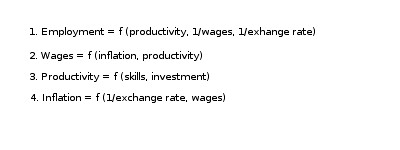- Workers stay away from mines
- Impact of Cosatu strike varied
- Nzimande: Revolution in danger
- Thousands march against job losses
- Strike could cost economy R2-billion (This article has a good narrative alluding to the points I raise in this post)
The idea of striking for jobs is fairly ironic, but not the irony I'm referring to.
Unionism succeeds based on the selfishness of the individual. This is in itself ironic given the Marxian principles upon which it is founded. Unions succeed because the individual wants a higher wage and job security.
While unions fight for a cause, they are organisations in themselves and thus vulnerable to internal politics. The single biggest driver of misalignment of the desires of the member and the union management is exactly this - politics of power. The greater the number and extent of dissatisfied members, the greater the power of the union bosses and organisation.
It is therefore in the interests of the union to, if not ferment dissatisfaction, certainly expose any latent dissatisfaction and given voice to any patent dissatisfaction.
Finally, a further need drives union activity. Should union members not see active, confrontational union activity, they devalue the benefits of belonging to such a union.
And so unions argue for jobs. Yet similarly they argue for higher wages. Given the above discussion, it is clear which point they will argue more vociferously. In fact some simple economic relationships indicate the levers we have towards job creation. They also expose the irony in union activity:

From the first equation, one can see that to increase employment, skills and productivity must be raised and inflation, wages and exchange rates lowered. The basis for this is international competitiveness. Should our productivity or skills be inferior to other nations or our wages, inflation and exchange rate be higher, we will lose out in the competition to produce goods. If our wages are higher, then we must be more productive, etc.
Unions argue for a living wage. They argue for job creation. Their lever of choice in the above is the exchange rate. Depreciate the Rand is their cry.
This ignores the relationships in equation 4. Depreciating the Rand leads to inflation. We are a developing country with a very open market - meaning we import many of our goods and services. Depreciating the exchange rate leads to inflation, putting upward pressure on wages (equation 2) and again making us uncompetitive. This is the very dangerous cycle we saw played out in the 90's, where high inflation led to higher wage demands which led to higher inflation.
The government's economic policy is a strength few have complimented enough. They have made the argument for the long term - bring down inflation through stabilising the exchange rate and increase productivity and skills. The short term implications of this is job losses as unproductive, expensive industries have shed workers. Only after a substantial period of a gentle depreciation of the Rand combined with higher productivity, lower inflation and lower wage demands do our industries become competitive again and able to grow employing more workers.
That's not a popular process with unions who are unable to sell the long term lower wage, high skill and higher productivity argument to their members. Especially with job losses in the short term.
It is not a wonder therefore that the South African Communist Party has expressed a view that it might have to split from the ANC-led Tri-Partite Alliance through disagreement on the GEAR economic policy.
Unions have many capable economists. But internal politics mean that their calls have the irony and paradox of short-termism - leading to higher wages but ultimately leading to increased job losses.
Given our relatively high wages for unskilled labour, certain industry is beyond South Africa's successful competition (e.g. most textile production). Other industries open to us - given our dollar-wage rate - require higher skills levels and greater productivity. This is the crux of growth and job-creation in South Africa. And that is not a popular union message.

No comments:
Post a Comment